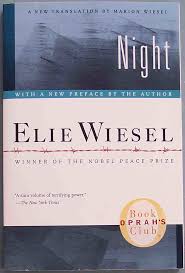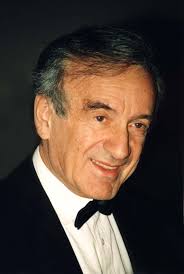Night Page #4
"Night" is a work by Elie Wiesel about his experience with his father in the Nazi German concentration camps at Auschwitz and Buchenwald in 1944–1945, at the height of the Holocaust toward the end of the Second World War. In just over 100 pages of sparse and fragmented narrative, Wiesel writes about the death of God and his own increasing disgust with humanity, reflected in the inversion of the parent–child relationship, as his father declines to a helpless state and Wiesel becomes his resentful teenage caregiver. "If only I could get rid of this dead weight ... Immediately I felt ashamed of myself, ashamed forever." In Night everything is inverted, every value destroyed. "Here there are no fathers, no brothers, no friends", a kapo tells him. "Everyone lives and dies for himself alone." Wiesel was 16 when Buchenwald was liberated by the United States Army in April 1945, too late for his father, who died after a beating while Wiesel lay silently
By eight o'clock in the morning, weariness had settled into our veins, our limbs, our brains, like molten lead. I was in the midst of prayer when suddenly there was shouting in the streets. I quickly unwound my phylacteries and ran to the window. Hungarian police had entered the ghetto and were yelling in the street nearby. "All Jews, outside! Hurry!" They were followed by Jewish police, who, their voices breaking, told us: "The time has c o m e ... y o u must leave all t h i s ... " The Hungarian police used their rifle butts, their clubs to indiscriminately strike old men and women, children and cripples. One by one, the houses emptied and the streets filled with people carrying bundles. By ten o'clock, everyone was outside. The police were taking roll calls, once, twice, twenty times. The heat was oppressive. Sweat streamed from people's faces and bodies. Children were crying for water. Water! There was water close by inside the houses, the backyards, but it was forbidden to break rank. "Water, Mother, I am thirsty!" Some of the Jewish police surreptitiously went to fill a few jugs. My sisters and I were still allowed to move about, as we were destined for the last convoy, and so we helped as best we could. AT LAST, at one o'clock in the afternoon came the signal to leave. There was joy, yes, joy. People must have thought there could be no greater torment in God's hell than that of being stranded here, on the sidewalk, among the bundles, in the middle of the street under a blazing sun. Anything seemed preferable to that. They began to walk without another glance at the abandoned streets, the dead, empty houses, the gardens, the tombstones... On everyone's back, there was a sack. In everyone's eyes, tears and distress. Slowly, heavily, the procession advanced toward the gate of the ghetto. And there I was, on the sidewalk, watching them file past, unable to move. Here came the Chief Rabbi, hunched over, his face strange looking without a beard, a bundle on his back. His very presence in the procession was enough to make the scene seem surreal. It was like a page torn from a book, a historical novel, perhaps, dealing with the captivity in Babylon or the Spanish Inquisition. They passed me by, one after the other, my teachers, my friends, the others, some of whom I had once feared, some of whom I had found ridiculous, all those whose lives I had shared for years. There they went, defeated, their bundles, their lives in tow, having left behind their homes, their childhood. They passed me by, like beaten dogs, with never a glance in my direction. They must have envied me. The procession disappeared around the corner. A few steps more and they were beyond the ghetto walls. The street resembled fairgrounds deserted in haste. There was a little of everything: suitcases, briefcases, bags, knives, dishes, banknotes, papers, faded portraits. All the things one planned to take along and finally left behind. They had ceased to matter. Open rooms everywhere. Gaping doors and windows looked out into the void. It all belonged to everyone since it no longer belonged to anyone. It was there for the taking. An open tomb. A summer sun. WE HAD SPENT the day without food. But we were not really hungry. We were exhausted. My father had accompanied the deportees as far as the ghetto's gate. They first had been herded through the main synagogue, where they were thoroughly searched to make sure they were not carrying away gold, silver, or any other valuables. There had been incidents of hysteria and harsh blows. "When will it be our turn?" I asked my father. "The day after tomorrow. Unless...things work out. A miracle, perhaps..." Where were the people being taken? Did anyone know yet? No, the secret was well kept. Night had fallen. That evening, we went to bed early. My father said: "Sleep peacefully, children. Nothing will happen until the day after tomorrow, Tuesday." Monday went by like a small summer cloud, like a dream in the first hours of dawn. Intent on preparing our backpacks, on baking breads and cakes, we no longer thought about anything. The verdict had been delivered. That evening, our mother made us go to bed early. To conserve our strength, she said. It was to be the last night spent in our house. I was up at dawn. I wanted to have time to pray before leaving. My father had risen before all of us, to seek information in town. He returned around eight o'clock. Good news: we were not leaving town today; we were only moving to the small ghetto. That is where we were to wait for the last transport. We would be the last to leave. At nine o'clock, the previous Sunday's scenes were repeated. Policemen wielding clubs were shouting: "All Jews outside!" We were ready. I went out first. I did not want to look at my parents' faces. I did not want to break into tears. We remained sitting in the middle of the street, like the others two days earlier. The same hellish sun. The same thirst. Only there was no one left to bring us water. I looked at my house in which I had spent years seeking my God, fasting to hasten the coming of the Messiah, imagining what my life would be like later. Yet I felt little sadness. My mind was empty. "Get up! Roll call!" We stood. We were counted. We sat down. We got up again. Over and over. We waited impatiently to be taken away. What were they waiting for? Finally, the order came: "Forward! March!" My father was crying. It was the first time I saw him cry. I had never thought it possible. As for my mother, she was walking, her face a mask, without a word, deep in thought. I looked at my little sister, Tzipora, her blond hair neatly combed, her red coat over her arm: a little girl of seven. On her back a bag too heavy for her. She was clenching her teeth; she already knew it was useless to complain. Here and there, the police were lashing out with their clubs: "Faster!" I had no strength left. The journey had just begun and I already felt so weak... "Faster! Faster! Move, you lazy good-for-nothings!" the Hungarian police were screaming. That was when I began to hate them, and my hatred remains our only link today. They were our first oppressors. They were the first faces of hell and death. They ordered us to run. We began to run. Who would have thought that we were so strong? From behind their windows, from behind their shutters, our fellow citizens watched as we passed. We finally arrived at our destination. Throwing down our bundles, we dropped to the ground: "Oh God, Master of the Universe, in your infinite compassion, have mercy on u s ... " THE SMALL GHETTO. Only three days ago, people were living here. People who owned the things we were using now. They had been expelled. And we had already forgotten all about them. The chaos was even greater here than in the large ghetto. Its inhabitants evidently had been caught by surprise. I visited the rooms that had been occupied by my Uncle Mendel's family. On the table, a half-finished bowl of soup. A platter of dough waiting to be baked. Everywhere on the floor there were books. Had my uncle meant to take them along? We settled in. (What a word!) I went looking for wood, my sisters lit a fire. Despite her fatigue, my mother began to prepare a meal. We cannot give up, we cannot give up, she kept repeating. People's morale was not so bad: we were beginning to get used to the situation. There were those who even voiced optimism. The Germans were running out of time to expel us, they argued... Tragically for those who had already been deported, it would be too late. As for us, chances were that we would be allowed to go on with our miserable little lives until the end of the war. The ghetto was not guarded. One could enter and leave as one pleased. Maria, our former maid, came to see us. Sobbing, she begged us to come with her to her village where she had prepared a safe shelter. My father wouldn't hear of it. He told me and my big sisters, "If you wish, go there. I shall stay here with your mother and the little one... Naturally, we refused to be separated.
Translation
Translate and read this book in other languages:
Select another language:
- - Select -
- 简体中文 (Chinese - Simplified)
- 繁體中文 (Chinese - Traditional)
- Español (Spanish)
- Esperanto (Esperanto)
- 日本語 (Japanese)
- Português (Portuguese)
- Deutsch (German)
- العربية (Arabic)
- Français (French)
- Русский (Russian)
- ಕನ್ನಡ (Kannada)
- 한국어 (Korean)
- עברית (Hebrew)
- Gaeilge (Irish)
- Українська (Ukrainian)
- اردو (Urdu)
- Magyar (Hungarian)
- मानक हिन्दी (Hindi)
- Indonesia (Indonesian)
- Italiano (Italian)
- தமிழ் (Tamil)
- Türkçe (Turkish)
- తెలుగు (Telugu)
- ภาษาไทย (Thai)
- Tiếng Việt (Vietnamese)
- Čeština (Czech)
- Polski (Polish)
- Bahasa Indonesia (Indonesian)
- Românește (Romanian)
- Nederlands (Dutch)
- Ελληνικά (Greek)
- Latinum (Latin)
- Svenska (Swedish)
- Dansk (Danish)
- Suomi (Finnish)
- فارسی (Persian)
- ייִדיש (Yiddish)
- հայերեն (Armenian)
- Norsk (Norwegian)
- English (English)
Citation
Use the citation below to add this book to your bibliography:
Style:MLAChicagoAPA
"Night Books." Literature.com. STANDS4 LLC, 2025. Web. 30 Jan. 2025. <https://www.literature.com/book/night_336>.








Discuss this Night book with the community:
Report Comment
We're doing our best to make sure our content is useful, accurate and safe.
If by any chance you spot an inappropriate comment while navigating through our website please use this form to let us know, and we'll take care of it shortly.
Attachment
You need to be logged in to favorite.
Log In